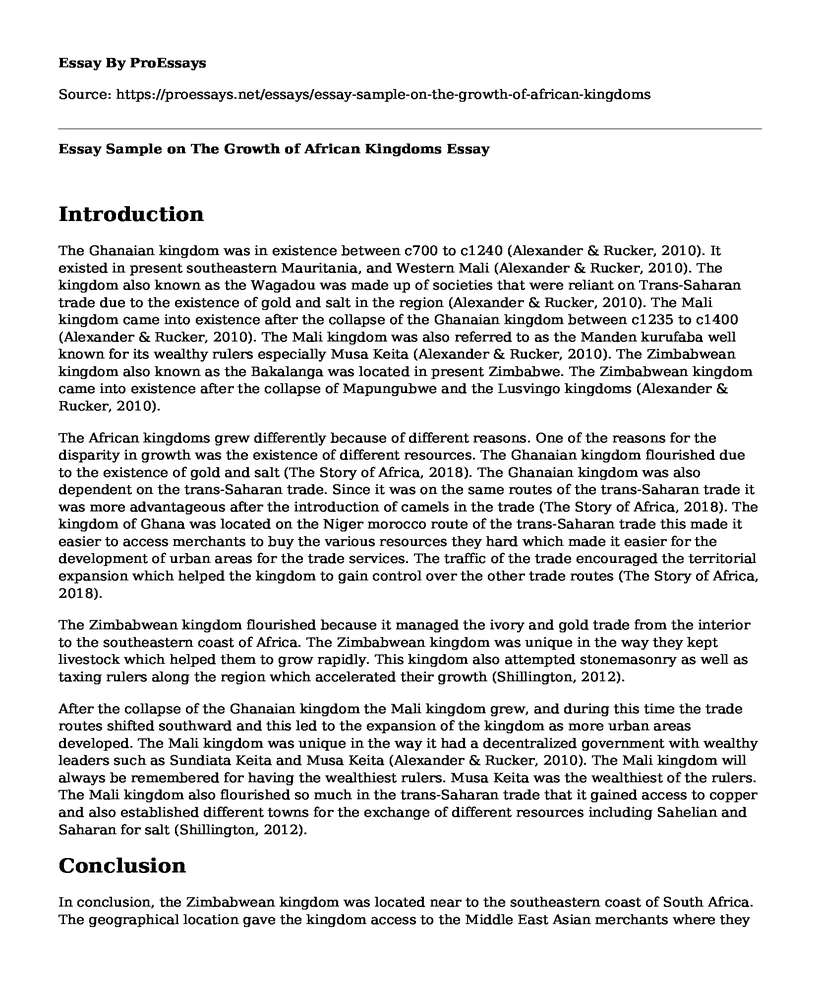Introduction
The Ghanaian kingdom was in existence between c700 to c1240 (Alexander & Rucker, 2010). It existed in present southeastern Mauritania, and Western Mali (Alexander & Rucker, 2010). The kingdom also known as the Wagadou was made up of societies that were reliant on Trans-Saharan trade due to the existence of gold and salt in the region (Alexander & Rucker, 2010). The Mali kingdom came into existence after the collapse of the Ghanaian kingdom between c1235 to c1400 (Alexander & Rucker, 2010). The Mali kingdom was also referred to as the Manden kurufaba well known for its wealthy rulers especially Musa Keita (Alexander & Rucker, 2010). The Zimbabwean kingdom also known as the Bakalanga was located in present Zimbabwe. The Zimbabwean kingdom came into existence after the collapse of Mapungubwe and the Lusvingo kingdoms (Alexander & Rucker, 2010).
The African kingdoms grew differently because of different reasons. One of the reasons for the disparity in growth was the existence of different resources. The Ghanaian kingdom flourished due to the existence of gold and salt (The Story of Africa, 2018). The Ghanaian kingdom was also dependent on the trans-Saharan trade. Since it was on the same routes of the trans-Saharan trade it was more advantageous after the introduction of camels in the trade (The Story of Africa, 2018). The kingdom of Ghana was located on the Niger morocco route of the trans-Saharan trade this made it easier to access merchants to buy the various resources they hard which made it easier for the development of urban areas for the trade services. The traffic of the trade encouraged the territorial expansion which helped the kingdom to gain control over the other trade routes (The Story of Africa, 2018).
The Zimbabwean kingdom flourished because it managed the ivory and gold trade from the interior to the southeastern coast of Africa. The Zimbabwean kingdom was unique in the way they kept livestock which helped them to grow rapidly. This kingdom also attempted stonemasonry as well as taxing rulers along the region which accelerated their growth (Shillington, 2012).
After the collapse of the Ghanaian kingdom the Mali kingdom grew, and during this time the trade routes shifted southward and this led to the expansion of the kingdom as more urban areas developed. The Mali kingdom was unique in the way it had a decentralized government with wealthy leaders such as Sundiata Keita and Musa Keita (Alexander & Rucker, 2010). The Mali kingdom will always be remembered for having the wealthiest rulers. Musa Keita was the wealthiest of the rulers. The Mali kingdom also flourished so much in the trans-Saharan trade that it gained access to copper and also established different towns for the exchange of different resources including Sahelian and Saharan for salt (Shillington, 2012).
Conclusion
In conclusion, the Zimbabwean kingdom was located near to the southeastern coast of South Africa. The geographical location gave the kingdom access to the Middle East Asian merchants where they sold their ivory and Gold. The Zimbabwean kingdom will always be remembered for the huge ivory sales they made to the Middle East Asian merchants and the artistically Stonemasonry they reached the epics of the kingdom walls. The Ghanaian kingdom left a big legacy behind, and it will always be remembered for the big army of warriors they were able to deploy comprising two hundred thousand warriors. The Mali Kingdom flourished from the trade of copper under the leadership of wealthy and intelligent leaders.
References
Alexander, L. M., & Rucker Jr, W. C. (Eds.). (2010). Encyclopedia of African American History [3 Volumes]. California: Abc-clio.
Shillington, K. (2012). History of Africa. Macmillan International Higher Education.
The Story of Africa (2018, September 13). BBC World Service. Retrieved from http://www.bbc.co.uk/worldservice/africa/features/storyofafrica/index_section4.shtml
Cite this page
Essay Sample on The Growth of African Kingdoms. (2022, Nov 08). Retrieved from https://proessays.net/essays/essay-sample-on-the-growth-of-african-kingdoms
If you are the original author of this essay and no longer wish to have it published on the ProEssays website, please click below to request its removal:
- Three Ways in Which Public Health England (PHE) Attempts to Minimize Inequalities in Health
- Essay Example on Fighting Crime: Analysing US Federal Structure's 6 Models
- Essay Example on Mutual Trust: Key to Effective Policing & Public Safet
- Book Analysis Essay on A Brilliant Solution: Inventing the American Constitution
- Essay Sample on Examining Discrimination and Its Consequences
- John Stuart Mill & Karl Marx: A Debate on Post-Ricardian Thought
- Report Example on Texas Prison Health Care Cost







